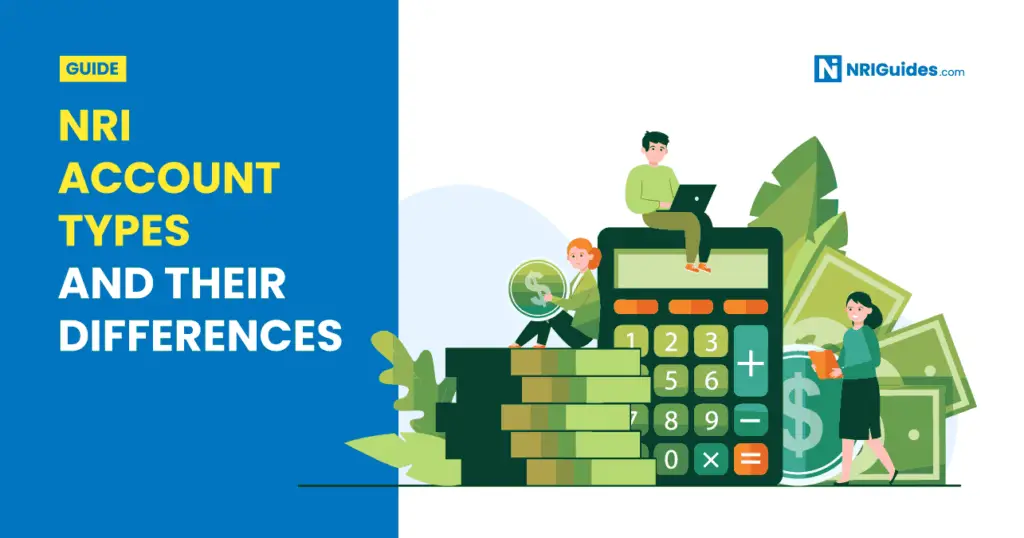The NRI Guides Team regularly reviews this article to ensure the content is up-to-date and accurate. The last editorial review and update were on 25 October 2023.
Many people make the common mistake of keeping their regular savings account even after they become Non-Resident Indians (NRIs), but the law doesn’t permit it. To put it simply, it’s against the rules to have a regular savings account as an NRI.
Under the regulations of the Foreign Exchange Management Act (FEMA), when your status changes to NRI, you’re required to switch your resident savings account to a Non-Resident account.
In this article, we’ll clarify the various NRI account types and what sets them apart. We’ll help you understand which NRI account suits you best and ensure you’re on the right financial track as an NRI.
Table of Contents
Most Common NRI Account Types
If you’re an NRI, understanding the types of accounts available to you is crucial. You have two primary options to consider: the NRE (Non-Resident External) account and the NRO (Non-Resident Ordinary) account. It’s essential to grasp the distinctions between these accounts to make an informed decision that aligns with your financial goals.
What Is An NRE Account?
The Non-Resident External (NRE) account is designed for NRIs to deposit their foreign earnings in Indian Rupees. The unique aspect of this account is that you can maintain your funds in the Indian currency.
Here are some key features of NRE account:
- Full Repatriation: The principal amount and the interest earned in an NRE account are fully repatriable. In simple terms, you can seamlessly transfer funds from India to a foreign country.
- Joint Accounts: NRIs can open NRE accounts jointly with other NRIs, offering flexibility for shared financial endeavours.
- Nomination Facilities: You can nominate individuals to your NRE account, making it a convenient option for estate planning.
- Tax-Free Interest: The interest you earn in an NRE account is exempt from Indian income tax, making it a tax-efficient choice.
- Fund Transfer: The funds in your NRE account can be transferred to NRE, NRO or regular savings accounts.
What Is An NRO Account?
An NRO account (Non-Resident Ordinary) is an account that helps you manage income from inside and outside India. If you primarily earn money abroad but also have some income in India, this type of account is a good fit for you.
To be eligible, you should have lived outside India for more than 120 days in a year and spent less than 365 days in India within four years.
Key features of the NRO account include:
- Repatriation Limitations: Unlike the NRE account, repatriation from an NRO account is allowed under specific conditions. As per the RBI’s guidelines, you can repatriate up to $1 million per financial year for purposes like education, medical expenses, and current income.
- Joint Accounts: You can hold an NRO account jointly with residents or other non-resident Indians, providing a broader range of account holders.
- Nomination Facilities: Similar to the NRE account, you can nominate individuals for your NRO account.
- Taxable Interest: The interest you earn in an NRO account is subject to Indian income tax.
- Fund Transfer: The funds in your NRO account cannot be transferred to NRE accounts.
Differences Between NRE And NRO Accounts
Here are the main differences between NRE and NRO accounts:
| Non Resident External (NRE) | Non-Resident Ordinary (NRO) |
|---|---|
| Remittance from external sources only | Remittance from external + local sources |
| The deposit is fully repatriable | Limitations on repatriation |
| Interest is tax-free | Interest is taxable |
| The account can be jointly held with NRIs only | The account can be jointly held with NRIs + Residents |
| Funds can be transferred to NRE or NRO | Funds cannot be transferred to NRE |
Which Account Should You Choose?
Choose an NRE Account If You:
- Earn foreign income and want to deposit it in Rupees.
- Wish to benefit from tax-free interest.
- Plan to repatriate funds easily.
- Prefer to open a joint account with another NRI.
Choose an NRO Account If You:
- Have Indian income sources, such as rent, dividends, or a pension.
- Need to open a joint account with a resident Indian.
- Have income or expenses in India, like insurance premiums or loan EMIs.
Key Points To Note
All income that is receivable in India such as rentals from property, investments, pension etc. has to be deposited in the NRO account.
Any payment towards insurance premiums or EMIs on loans that you availed while in India can be mandated from an NRE/NRO account.
Any investment you make in India can be funded from an NRE/NRO account.
Both accounts can be opened as Savings as well as Current accounts and are Indian Rupee accounts.
In summary, opening an NRE account for your foreign remittances and an NRO account for income from India is often the ideal choice. This strategy allows you to enjoy tax-free interest and limitless repatriation with the NRE account while easily managing Indian transactions with the NRO account.
FCNR Account
In addition to NRE and NRO accounts, there’s another type of NRI account known as the FCNR (Foreign Currency Non-Resident) account.
This account is a fixed deposit account specifically designed for depositing income earned overseas and is held in foreign currencies like USD, GBP, JPY, CAD, AUD, SGD, and HKD.
Key points about FCNR accounts include:
- They typically offer lower interest rates compared to NRE accounts.
- FCNR deposits are less exposed to fluctuations in the value of the Indian Rupee, making them a stable choice.
- You can hold FCNR deposits for tenures ranging from 1 year to 5 years.
- Funds held in FCNR accounts are fully repatriable.
- FCNR accounts are generally exempt from TDS (Tax Deducted at Source) in India.
Most banks also provide overdraft facilities against FCNR deposits, which can be disbursed in Indian Rupees and utilized within India. However, if you withdraw your deposit before completing one year, no interest will be paid.
In conclusion, understanding the various NRI account types empowers you to make informed financial decisions, aligning your accounts with your income sources and financial goals. Whether you opt for an NRE, NRO, or FCNR account, each offers distinct advantages to suit your specific financial needs as an NRI.
Reference: Reserve Bank of India
You May Also Like:
- NRI Joint Account With Residents
- NRI Fixed Deposit Types, Benefits and Interest Rates
- Indian Customs Rules For Carrying Cash
Copyright © NRIGuides.com – Unauthorized reproduction of this article in any language is prohibited. The information provided on this website is intended for general guidance and informational purposes only. It should not be considered a substitute for professional advice, and travellers are encouraged to verify visa requirements and travel advisories through official government sources before making any travel arrangements.

Aneesh, the Founder & Editor of DG Pixels, holds a Master’s Degree in Communication & Journalism, and has two decades of experience living in the Middle East. Since 2014, he and his team have been sharing helpful content on travel, visa rules, and expatriate affairs.
